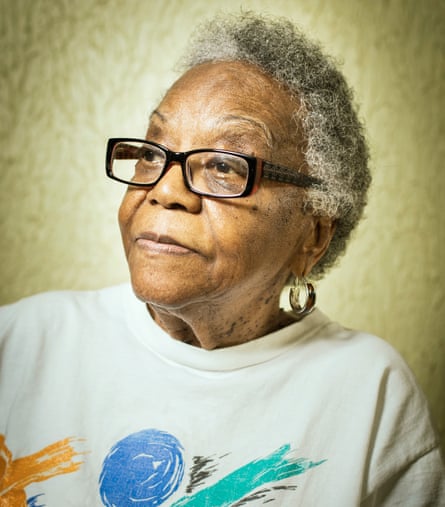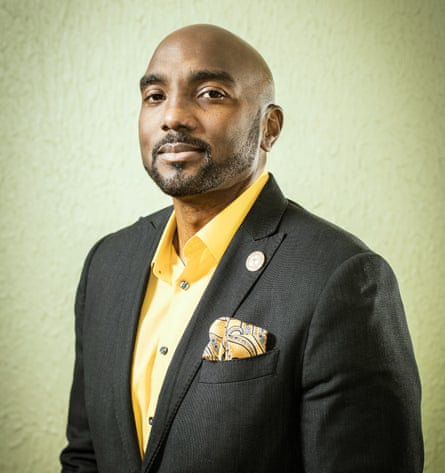Johnnie Mae Austin and her grandson, Damario Solomon-Simmons, can tell you everything about their ancestry. They can go back as far as 1810, the year Solomon-Simmons’ great-great-great-great-grandfather, Cow Tom, was born. With undeniable pride, they recount the man’s feats of bravery during the civil war, and his leadership within Oklahoma’s Creek population.
In fact, they are so determined to let the world know exactly who Cow Tom was that they’re suing the Creek nation to make sure his descendants aren’t forgotten.
Solomon-Simmons and his grandmother are black, but they argue they’re also Creek, and they’re fighting to reclaim their identity.
In 1979, a new tribal constitution made it more difficult to prove Creek ancestry. Black Creeks in particular found it almost impossible to claim the identity their ancestors and as a result, thousands lost their Creek citizenship.
In August 2018, Solomon-Simmons – the lead attorney representing six named plaintiffs, including his grandmother – filed a lawsuit against the Muscogee Creek nation and the interior department to fully restore the citizenship of black Creeks.
As a result, a minority group is suing another minority group for inclusion in the indigenous minority group – and to settle this peculiar case, one has to go back nearly 200 years.

Austin, 86, was born in Haskell, Oklahoma. Her grandfather, Jake Simmons, “was Creek to the bone,” she says. Simmons spoke fluent Creek, and Austin chuckles at the memory of him using Creek curse words. When I interviewed her in her North Tulsa home, she sang me one of the songs her grandfather taught her – also in Creek.
Jake Simmons was Cow Tom’s grandson. He, like other black slaves owned by Native Americans, made his way west on the Trail of Tears (the forced relocation of Native American peoples) from Florida to Oklahoma.
Some of Cow Tom’s descendants dispute he was ever a slave; some documents say he was initially a Creek slave; either way, he arrived in Oklahoma in the early 1830s and soon became a pillar of the black Creek community, and a man of considerable economic and political stature. Accounts from Cow Tom’s grandchildren describe him as a “jet black man of medium build” whose success was measured by his seemingly “unlimited supply of cattle”.
A cultural broker helped by his English skills and familiarity with white American culture, Cow Tom eventually served as the principal chief of Canadian Town, a freed black township within the Creek nation, and also represented the Creek nation before the interior department.
Cow Tom’s success was not particularly unique among hardworking black Creeks in eastern Oklahoma. On 18 November 1910, the Topeka Plaindealer reported that “a large percentage of the negro population on the eastern side of the state [had] rich allotments from their Indian citizenship”.
According to the same article, many of them started out as slaves of the Creeks, but gained freedom through the Emancipation Proclamation. The US government compelled Native Americans to “sign treaties allowing their former negro slaves to share in their landed inheritance”, meaning black former slaves were given plots of land in the Creek community.

In Oklahoma, in the late 1970s, Austin routinely received mail from the Creek nation. The mail typically included news, ballots for voting on tribal matters, and checks for shares of the revenue from land and cattle dealings.
That mail was a connection to an identity Austin always thought was true – “It’s just who I was,” she says – until the mail suddenly stopped in 1979.
This was the result of a 1976 federal lawsuit, during which the Creeks had manage to shake off some of the paternalistic reach of the US government. Creeks then voted to reconstitute citizenship parameters, kicking out many black people who had enjoyed citizenship since 1866.
According to Dr Daniel Littlefield of the Sequoyah National Research Center: “There’s a strong element of ‘we are a tribe’ Indians [to that decision]. So I think it was probably just out-and-out racism that motivated those people” to remove black people from inclusion in the nation.
Citizenship parameters were now limited to those who could find ancestors registered on the 1906 Dawes Rolls, a special federal census that defined Native Americans according to the vague principle of “blood quantum”.
Without the intricate genealogical testing that is readily accessible now, the Dawes Rolls – based on interviews and eyeballing of people’s ancestry – yielded less than precise results. Austin recalls a family story about her grandparents; one, who looked very dark, was assumed not to have Creek ancestry, and another, whose skin tone was very light, was assumed to be Creek. But both were equally Creek.
Today, if you want Creek citizenship, “you would have to find a direct lineage to [a] person on that roll,” Nathan Wilson of the Creek citizenship office says.
Austin can’t trace her direct lineage to the “Creek by blood” list of that roll which the citizenship office uses for validating citizenship. But her family can be found on the Creek Freedman list of the Dawes roll. Coincidentally, their own and their ancestors’ blackness nullified their Creek by blood status.
Instead, their case rests on an 1866 treaty between the US government and the Creek nation, which makes plain the nation’s thoughts on citizenship.
“[T]here are among the Creeks many persons of African descent,” the treaty notes, and lists Cow Tom as an official delegate of the Creeks.

The treaty states that “persons lawfully residing in said Creek country” or even those who temporarily left, as well as their descendants, “may return within one year from the ratification of this treaty”, as can “their descendants and such others of the same race as may be permitted by the laws of the said nation to settle within the limits of the jurisdiction of the Creek nation as citizens”.
All descendants, the treaty adds, “shall have and enjoy all the rights and privileges of native citizens […] and the laws of the said nation shall be equally binding upon and give equal protection to all such persons, and all others, of whatsoever race or color, who may be adopted as citizens or members of said tribe”.
Solomon-Simmons says the Creek nation is “not a race, it’s a political entity, and they’ve got obligations”. His main claim is that that treaty is “still good law and hasn’t been abrogated”.
He anticipated the Creek nation’s arguments: “They’re going to say [they] have a right to determine who are citizens.” Technically, he agreed. “I believe that it is your right to determine citizenship like any other sovereign nation – but just like any other sovereign nation, not a race, you [the Creeks] signed a treaty.”
This isn’t Solomon-Simmons’ first legal battle with the Creek nation. In the early 2000s, he tried two cases somewhat similar to the one he filed this summer. But back then, he did so within the Creek nation’s judicial system, with two other descendants of black Creeks – Ron Graham and Fred Johnson – as his clients. After several bouts in the Creek nation judicial system, Solomon-Simmons lost the case.
The setback hasn’t stopped him. As he pushes forward with his case, he follows in the footsteps of two earlier activists, Rhonda Grayson and Sharon Lenzy.
Both are relatively unassuming women and trailblazing activists for citizenship rights of black Creeks.
Grayson, a financial manager of a delivery and repair service, grew up partly on the country roads of Wewoka, Oklahoma, where her great-grandmother, America Cohee lived.
Cohee “only spoke the Creek language and she only attended the Indian church”, Grayson told me as she stared at the picture, rubbing her hands along the glossy laminated frame. “She was 90 when we were kicked out of the nation.”

As a young person, Grayson didn’t know about her family’s expulsion from the nation. It was only when she talked with her grandmother that she decided to start “doing my own research in the early 2000s by just going to the Oklahoma History Center”. She “wondered why my mother, my aunts, no one was enrolled in the tribe until someone at the history center told me that my family were on Creek freedmen rolls”.
Lenzy, a retired hospital manager, recalled her mother telling her of their ancestor Legus Choteau Perryman, a black man who served as principal chief of the Creek nation from 1887 to 1895.
She didn’t realize she was a black Creek member until 1979, because the distinction did not have much meaning before then. For Lenzy and her mother, she was Creek first.
When her official Creek mail stopped coming, “My mother called the Creek nation and they told [her and my grandmother] that they were freedmen and weren’t entitled to anymore checks,” Lenzy said.
Lenzy showed me a 1980 letter from the Department of the Interior’s Bureau of Indian Affairs – which only affirmed what the nation told her mother. Despite numerous denied citizenship applications, Lenzy holds fast to something her mother told her: “Don’t forget your heritage and don’t let anyone tell you anything different.”
She and Grayson joined forces with other Creek descendants in 2012 to file for recognition, host national conferences, and create a documentary currently in development on the history of Creek freedmen.
Now, as named plaintiffs in Solomon-Simmons’ lawsuit, their motivation is clear: they want visibility.
“We are left out of Oklahoma history,” Grayson says. “It is a missing piece of history and it’s a valuable piece of history. Oklahoma history wouldn’t be – can’t be – history without the Creek freedmen.”
According to Alaina Roberts of the University of Pittsburgh, Native American nations “have always had this fear, and a valid fear, that when they accept black people as part of their tribe they are seen as not ‘Indian first’.”
Roberts explains that “Indian-ness is self-imposed as well as imposed from the outside: these nations have their own sense of who they are based on their culture and the traditions they have retained”, but also by the way they are legally recognized either by the state or federal government.
This legal recognition, which often meant the unfair takeover of settled land, represents an “imposition from outsiders – white outsiders – as to how much culture they’re retaining.”
In fact, in the minutes of a 1977 quarterly Creek national council meeting, the then principal chief Claude Cox expressed his concern with the former 1866 Treaty and associated constitution of 1867: “[W]hen you go back to the old constitution, you are licked before you start because it doesn’t talk about Indians, it talks about citizens,” he told the council.
Referring explicitly to black districts within the Creek community, he described his fear of being outnumbered: “[I]f we want to keep the Indian in control, we’ve got to take a good look at this thing and get us a constitution that will keep the Creek Indian in control.”
But this isn’t just about identity, as identity parameters could dictate sharing in financial gains.
Roberts says the actual disenfranchisement of black people by the Creeks and the Cherokee started in the late 20th century coincided with a time when a lot of the tribes had begun to build their economies and make a lot of money. She points out this was precisely the time when many of the Nations started to see an “influx of enrollment applications”.
The current Creek principal chief, Jamie Floyd, declined to comment, and his press officers referred me to the nation’s citizenship office led by Nathan Wilson. “We’re an independent agency constitutionally and we’re listed in the Constitution as independent,” Wilson told me.
But the vagueness of the nation’s response shouldn’t be read as a dismissal of the importance of the citizenship issue. In fact, the Creek nation is lawyering up. Venable LLP, a top Washington DC law firm, contacted Solomon-Simmons in August on behalf of the Creek nation. Both the Creek nation and the interior department have filed motions to dismiss on 5 October and the court will respond on 2 November.
Creek leaders know that this won’t be an easy fight: the Cherokee nation and Seminole nation lost in 2017 on similar grounds.
For Solomon-Simmons, the case is clear-cut. His message to the Creek nation is succinct: “You have to follow the law like everybody else.”
